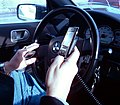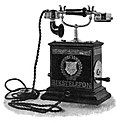Portal:Telephones

A telephone, colloquially referred to as a phone, is a telecommunications device that enables two or more users to conduct a conversation when they are too far apart to be easily heard directly. A telephone converts sound, typically and most efficiently the human voice, into electronic signals that are transmitted via cables and other communication channels to another telephone which reproduces the sound to the receiving user. The term is derived from Ancient Greek: τῆλε, romanized: tēle, lit. 'far' and φωνή (phōnē, voice), together meaning distant voice.
In 1876, Alexander Graham Bell was the first to be granted a United States patent for a device that produced clearly intelligible replication of the human voice at a second device. This instrument was further developed by many others, and became rapidly indispensable in business, government, and in households. (Full article...)

A mobile phone or cell phone is a portable telephone that allows users to make and receive calls over a radio frequency link while moving within a designated telephone service area, unlike fixed-location phones (landline phones). This radio frequency link connects to the switching systems of a mobile phone operator, providing access to the public switched telephone network (PSTN). Modern mobile telephony relies on a cellular network architecture, which is why mobile phones are often referred to as 'cell phones' in North America. (Full article...)
A smartphone is a mobile phone with advanced computing capabilities. It typically has a touchscreen interface, allowing users to access a wide range of applications and services, such as web browsing, email, and social media, as well as multimedia playback and streaming. Smartphones have built-in cameras, GPS navigation, and support for various communication methods, including voice calls, text messaging, and internet-based messaging apps. Smartphones are distinguished from older-design feature phones by their more advanced hardware capabilities and extensive mobile operating systems, access to the internet, business applications, mobile payments, and multimedia functionality, including music, video, gaming, radio, and television. (Full article...)
Selected article -

Project Ara was a modular smartphone project under development by Google. The project was originally headed by the Advanced Technology and Projects team within Motorola Mobility while it was a Google subsidiary. Google retained the ATAP group when selling Motorola Mobility to Lenovo, and it was placed under the stewardship of the Android development staff; Ara was later split off as an independent operation. Google stated that Project Ara was being designed to be utilized by "6 billion people": 1 billion current smartphone users, and 5 billion feature phone users.
Under its original design, as envisioned by NewDealDesign, under the leadership of Gadi Amit, Project Ara was intended to consist of hardware modules providing common smartphone parts, such as processors, displays, batteries, and cameras, as well as modules providing more specialized components, and "frames" that these modules were to be attached to. This design would allow a device to be upgraded over time with new capabilities and upgraded without requiring the purchase of an entire new device, providing a longer lifecycle for the device and potentially reducing electronic waste. However, by 2016, the concept had been revised, resulting in a base phone with non-upgradable core components, and modules providing supplemental features.
Google planned to launch a new developer version of Ara in the fourth quarter of 2016, with a target bill of materials cost of $50 for a basic phone, leading into a planned consumer launch in 2017. However, on September 2, 2016, Reuters reported that two non-disclosed sources leaked that Alphabet's manufacture of frames had been canceled, with possible future licensing to third parties. Later that day, Google confirmed that Project Ara had been shelved. (Full article...)
Types of phones -

A shoe phone is a shoe that has a telephone within it. Though there is no specific evidence that spies or those involved in espionage actually used shoe phones, they were popularised by fictional spies in television shows, most notably the television series Get Smart. Modern mobile phone technology has allowed for the development and production of working shoe phones. (Full article...)
Selected audio -
A busy signal (or busy tone or engaged tone) in telephony is an audible call-progress tone or audible signal to the calling party that indicates failure to complete the requested connection of that particular telephone call. (Full article...)
List articles

- Comparison of smartphones
- List of best-selling mobile phones
- List of countries by number of broadband Internet subscriptions
- List of countries by number of telephone lines in use
- List of countries by smartphone penetration
- List of country calling codes
- List of iPhone models
- List of mobile network operators
- List of mobile phone brands by country
- List of mobile phone generations
- List of telecommunications companies
Related portals
General images -
Selected biography
Douglas H. Ring (March 28, 1907 in Montana – September 8, 2000 in Red Bank, New Jersey) was one of the Bell Labs engineers that invented the cell phone. The history of cellular phone technology began on December 11, 1947 with an internal memo written by Douglas H. Ring in which he proposed development of a cellular telephone system by AT&T.
Although Martin Cooper of Motorola is considered the inventor of the first handheld cellular telephone and the first person to demonstrate to reporters a handheld cell phone call, Cooper's April 1973 call used cellular telephone technology invented and developed by Bell Labs engineers. (Full article...)
Selected images
Topics
Subcategories

More
 |
Here are some tasks awaiting attention:
|
Telephones in the news
No recent news
Associated Wikimedia
The following Wikimedia Foundation sister projects provide more on this subject:
-
Commons
Free media repository -
Wikibooks
Free textbooks and manuals -
Wikidata
Free knowledge base -
Wikinews
Free-content news -
Wikiquote
Collection of quotations -
Wikisource
Free-content library -
Wikiversity
Free learning tools -
Wiktionary
Dictionary and thesaurus
















































































































